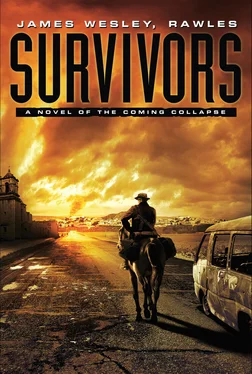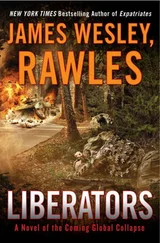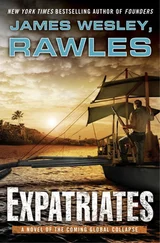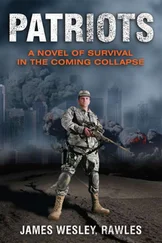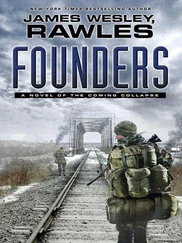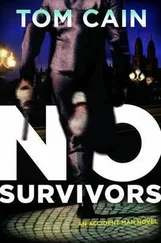By 1100, only twenty-one ground crew and seven pilots had gathered. There was just one other captain. They quizzed each other and found that Doyle’s date of rank was eighteen months earlier, giving Ian seniority. In the distance they could see smoke rising from fires all over Phoenix, and there was an almost constant crackle of gunfire. Some of it sounded nearby, in Glendale. Doyle ordered the assembled gaggle to fall in to a proper formation. He called: “Attention! Stand at… ease!”
He took a deep breath and began, “Gentlemen, this is a sad day for me and a sad day for the Air Force. As a captain, I am the ranking officer on base, so that makes me the de facto commander of all of the Luke facilities. As you know, the rotation to Saudi had our numbers greatly depleted even before the Crunch. And now there’s no grid power, and the backup ATC generators have run out fuel. The water towers are now dry and of course there’s no electricity to refill them. As I’m sure you’ve heard, there were a lot of emergency requisitions of aircraft, some under dubious pretenses. More recently, there have been several aircraft that were without a doubt stolen , with no flight plans filed and without benefit of tower clearance. Those were our last flightworthy aircraft. The local gangs are starting to strip outlying buildings, and there are no more security personnel to maintain any kind of perimeter. We have no unit integrity or any functioning chain of command. I have determined that our position is untenable, and we are incapable of carrying out any useful mission. At this point, even our personal safety is at risk.”
Doyle let that sink in and then continued, “The last straw was this morning, when I was informed that there isn’t so much as a can of beans left in the dining facilities. The bottom line is that we can’t keep you if we can’t feed you. Therefore, I’m hereby releasing all of the personnel on base. As of the end of this formation, your status will be on indefinite leave until either your ETS date or until you hear further orders from any commissioned Air Force officer from any command that is in a bona fide position of authority. Gentlemen, you are hereby released. You will be in my prayers. That is all. Dismissed!”
After the formation, Ian drove to the Air Force Security arms room. He found that the front door’s latch mechanism was missing. It had been cut out with a cutting torch. Inside, he found that the building had been ransacked. The bodies of two dead men in civilian clothes but with short-cropped military haircuts were sprawled on the floor. Between them was an oxyacetylene torch cart. Both of the men had been shot. Their bodies were puffy and smelled putrid. The sight sickened Doyle, who had never seen a human corpse up close before. To Doyle, it was obvious that the men had used the cutting torch to get into the arms room. Nine rifle and pistol racks had been cut open and emptied. What had happened after that was anyone’s guess. Perhaps there had been a double cross. All of the arms racks were empty, save one that was still locked. It held five M16A2 rifles. Doyle muttered to himself, “Well, I can’t leave these unsecured.”
He lit the torch and cut the lock off the remaining rack. Carrying out the five M16s to his Suburban took just one trip with the rifles slung over both shoulders. His search of the building revealed a box of twenty-three loaded M16 magazines that was underneath a duty roster binder in a file cabinet. He also found just one M16 cleaning kit.
Anahuac, Texas Late October, the First Year
When the Texas power grid went down, Dallas, Houston, San Antonio, Dallas, Austin, and Fort Worth were soon overcome by riots and looting. Once the local radio station reported simultaneous rioting in all of those cities, Garcia declared it was time for La Fuerza to roll.
A total of fifty-three adults and twenty-three children wheeled out of the Anahuac warehouse in a parade of twenty-six vehicles, and they never came back. They poured out of the warehouse like hornets from a nest. Downtown Anahuac was first on their list.
“A nation is the more prosperous today the less it has tried to put obstacles in the way of the spirit of free enterprise and private initiative. The people of the United States are more prosperous than the inhabitants of all other countries because their government embarked later than the governments in other parts of the world upon the policy of obstructing business.”
— Ludwig von Mises,
The Anticapitalistic Mentality (1972)
Elizabethtown, Hardin County, Kentucky Late October, the First Year
“I hereby call this meeting to order. Sally is taking the minutes.” Hutchings scanned the faces around the table. Most of them looked nervous and uncertain. Uhlich just looked slightly bemused. There were three attorneys, two bank managers, an IRS special agent, and Uhlich. Aside from the general, Hutchings had known most of the men since high school. Seated by the wall were the county sheriff, the acting chief of police, and two men wearing OCPs who had arrived with Uhlich: a command sergeant major and a young lieutenant, Uhlich’s aide-de-camp. A court reporter sat to one side, silently tapping at a battery-powered stenotype machine. The County Office Building smelled musty with the power out.
Hutchings continued: “Given the, uh, unprecedented situation nationwide, it has become clear that action must be taken to restore order in Hardin County and beyond. I’ve asked General Uhlich to be part of this emergency council in an advisory capacity. I need y’all’s agreement that we will take whatever means are necessary to get things set back in order.”
There were nods of agreement, so Hutchings went on, “I’d like to make a motion that martial law be declared, amplifying the existing declaration from the state of Kentucky, and that henceforth looters will be shot on sight. Requisitioning of supplies and manpower will be made by force, if need be.”
Bloomfield, New Mexico May, the First Year
L. Roy Martin hired the Cuban just six months before the Crunch, snatching him away from a refinery in Oklahoma. Ricardo Lopez had a reputation as a very resourceful petroleum engineer. Growing up in Cuba in the 1970s and 1980s, he had learned to improvise everything. Under Lopez’s leadership, the Bloomfield plant’s Unit No. 2 was immediately diversified, adding the ability to isolate and decant a variety of fractions and compounds that previously had been dismissed as uneconomical for the plant. Heretofore, working with Four Corners Light Sweet Crude and natural gas was seen as economical for just light fuels.
Having been given carte blanche by Martin, Lopez soon developed a reputation as a space hog, filling up nearly all of the available warehouse space with plastic containers of various shapes and sizes and in large quantities.
He bought thousands of unmarked five-gallon oil cans (the type most typically used for commercial sale of hydraulic fluid), military-specification twenty-liter “Scepter” cans and spouts, and thirty thousand empty one-quart oil bottles. Lopez bought so many small containers that additional storage space had to be brought in: fourteen continental express (CONEX) forty-foot shipping containers were purchased, repainted white to match the Bloomfield storage tanks, and lined up in a phalanx next to the Bulk Lube building, near the front gate. These CONEXes were stuffed full of factory-new unlabeled bottles, jugs, cans, and small drums of all descriptions.
It was Lopez’s large purchase of the Scepter cans that caused Phil McReady, the plant manager, to finally complain to Martin. McReady walked into L. Roy’s office with a stern look on his face. He was carrying a copy of the Scepter purchase order. McReady slapped the PO down on Martin’s desk and exclaimed, “Sir, have you seen this?”
Читать дальше
